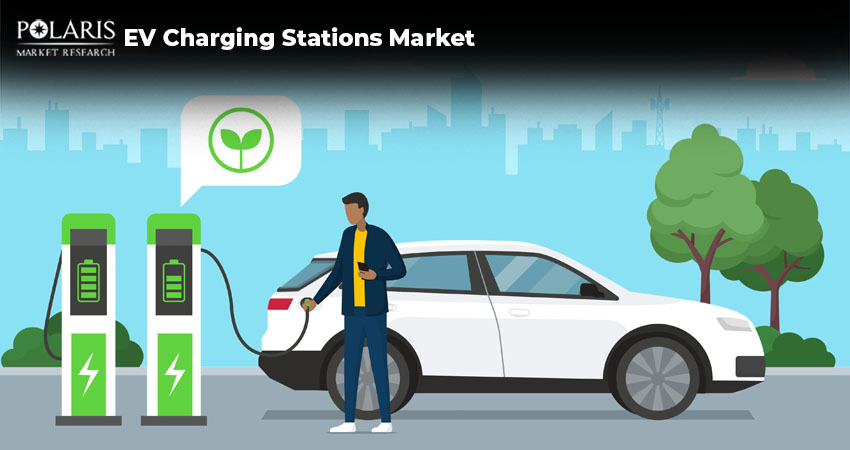Top 7 Electric Vehicle Charging Station Companies in Global Market 2025

The electric vehicle (EV) revolution is no longer a distant dream; it’s here, and it’s transforming the way we think about transportation. As the world shifts toward sustainable energy solutions, electric vehicles have emerged as a key player in reducing carbon emissions and combating climate change. However, the success of EVs relies on one critical factor: the availability and efficiency of charging infrastructure. Electric vehicle charging stations are the backbone of this transition, enabling drivers to power their vehicles conveniently and reliably.
From fast-charging networks to innovative software solutions, a bunch of companies are stepping up to build the infrastructure needed to support this growing market. In this blog, we’ll explore what are EV charging stations, their types, the major players in the market, and how their efforts are shaping the future of mobility.
What are EV Charging Stations?
EV charging stations, also known as electric vehicle supply equipment (EVSE), are infrastructure that provides electric power to recharge the batteries of plug-in electric vehicles and other EVs. They can be categorized by charging speed and location (public, workplace, or home). EV charging stations serve the critical function of replenishing battery power for electric vehicles, similar to gas stations for internal combustion engine cars. These stations vary in terms of power output, charging speed, and accessibility.
Types of EV Charging Stations
EV charging stations come in various forms, each catering to different needs and use cases. Following is a breakdown of the three main types:
Level 1 Charging: This is the simplest form of charging, using a standard household outlet of 120 volts. While convenient for home use, Level 1 charging is slow, typically providing 2-5 miles of range per hour. It’s best suited for drivers with minimal daily mileage or for overnight charging.
Level 2 Charging: Level 2 chargers function at 240 volts and are usually found in commercial, residential, and public settings. They offer a significant improvement in charging speed, delivering 10-60 miles of range per hour. These chargers are ideal for workplaces, shopping centers, and homes where faster charging is needed.
DC Fast Charging: Also known as Level 3 charging, DC fast chargers are the fastest option available, capable of providing 60-100 miles of range in just 20 minutes. These chargers are typically located alongside highways, freeways, and major travel routes, making them essential for long-distance travel.
Key Players in EV Charging Stations
Founded: 2003 (in San Carlos, California, USA)
Headquarters: Austin, Texas, USA.
Tesla is a leader in electric vehicle manufacturing as well as a pioneer in charging infrastructure. The company’s Supercharger network is one of the most reliable and extensively used fast-charging systems in the world. Tesila is also working on next-generation chargers that promise even faster charging times.
- ChargePoint
Founded: 2007
Headquarters: Campbell, California, USA.
ChargePoint is one of the largest and most well-known EV charging networks, operating in North America and Europe. ChargePoint is a public company, that is focused on building and providing the best electric vehicle (EV) charging experience for each and everyone who’s involved in the shift to electrification of mobility. The company offers a comprehensive range of charging solutions, including Level 2 and DC fast chargers, as well as cloud-based software for managing charging stations.
- EVgo
Founded: 2010
Headquarters: Los Angeles, California, USA.
EVgo is a leading provider of fast-charging stations in the United States, with a focus on urban and suburban areas. The company operates over 800 fast-charging locations and is known for its commitment to renewable energy, with many of its stations powered by 100% renewable electricity. EVgo’s partnerships with automakers like Nissan and GM have further solidified its position in the market.
Founded: 1988
Headquarters: Zurich, Switzerland.
ABB was formed through the merger of ASEA (Sweden) and BBC (Switzerland). It is a global technology leader in automation and electrification, helping industries run at high performance while becoming more productive, efficient, and sustainable. The company’s Terra HP chargers are capable of delivering up to 350 kW, making them ideal for fleet operators and long-distance travelers. ABB is also involved in projects to integrate charging infrastructure with renewable energy sources.
- Shell Recharge
Founded: 2008
Headquarters: Los Angeles, California, USA.
Shell Recharge is a global leader in smart EV charging solutions, offering turnkey products and services for various locations, including homes, workplaces, and on-the-go. The company is leveraging its existing network of gas stations to install fast chargers, providing a familiar and convenient option for drivers. Shell Recharge is also exploring innovative solutions like battery swapping and mobile charging units.
Innovations in EV Charging Stations
1) Faster Charging
- Ultra-fast Charging: Further pushing the boundaries of charging speed, ultra-fast charging aims to achieve charging times comparable to refueling a gasoline vehicle.
- DC Fast Charging: This technology allows for significantly faster charging times compared to traditional AC charging, reducing wait times for EV drivers.
2) Bidirectional Charging
- Vehicle-to-Grid (V2G): This technology enables EVs to not only draw power from the grid but also to discharge their batteries back into the grid, providing a valuable service to grid operators and enhancing grid stability.
- Vehicle-to-Load (V2L): EVs can also power external devices and appliances, offering a portable power source in emergency situations or for outdoor activities.
3) Renewable Energy Integration
- Solar-Powered Charging: EVs can be charged using solar panels, promoting sustainable and environmentally friendly charging practices.
- Off-Grid Charging: Battery-powered charging stations and mobile charging solutions can provide charging access in areas where grid infrastructure is limited or unavailable.
Conclusion
The rise of electric vehicles (EVs) is reshaping the automotive industry, and charging infrastructure is at the heart of this transformation. As the industry continues to evolve, we can expect to see even more innovation, collaboration, and investment in this critical sector. With the rapid advancements in technology and the growing commitment to sustainability, the future of electric vehicle charging stations looks brighter than ever.

